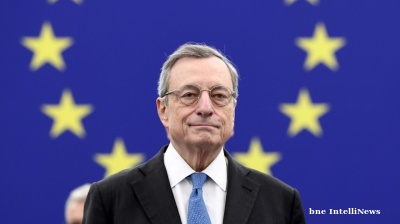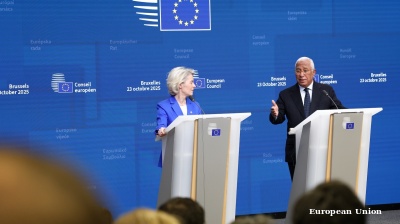Swedish furniture giant IKEA is going to try and enter the Ukrainian market for a third time. The company was interested in opening its iconic yellow and blue stores in Ukraine – the same colours as the Ukrainian flag – in 2005 and 2010, but plans unravelled because of the endemic corruption scared the retailer off.
"It's no secret that for IKEA, which is currently planning to enter the Ukrainian market, one of the biggest issues is the situation with corruption," Martin Hagström, Swedish ambassador to Ukraine, said in an interview in February. "I think that the fact that IKEA has decided to come to Ukraine is a sign that the company sees the changes [in the country] and is confident that it will be able to work here based on its principles."
This statement followed an announcement in December by the Swedish furniture retailer that it intended to enter the Ukrainian market. According to IKEA, the decision to enter a new country is made by the company on the basis of "thorough market studies in which franchisees are carefully evaluated".
IKEA South East Europe (SEE) will run the operations in Ukraine. IKEA SEE also handles the IKEA retail operations in Croatia, Serbia, Romania and Slovenia. They are currently in the process of identifying a suitable business model that would allow the large number of potential customers to shop in IKEA in Kyiv within one or two years, according to the company's media office.
"After the initial market studies are conducted, they will be able to share more details of the future investment in Ukraine," added the furniture giant, which currently operates 411 stores in 49 markets, as well as 11 groups of franchisees.
The store is a hallmark of economic development and by this yardstick Ukraine is well behind the rest of the region. When IKEA opened its first store in Russia in 2000 that marked the beginning of a decade long consumer driven boom and the chain has since spread across the country, which has become one of its most important markets. An IKEA store would be a coming of age for Ukraine’s retail sector.
However, this attempt to enter Ukraine's market, which has a population of almost 40mn, is not the first one for IKEA.
The company first announced its plans to enter Ukraine in 2005. They planned to construct a commercial and entertainment centre in the vicinity of Kyiv, but were unable to reach an agreement with the authorities on the allocation of a plot of land near the Kyiv-Boryspil highway.
Later, IKEA acquired a 64-hectare plot of land in Odessa region for the construction of one of its stores, but this project also failed to materialise. In 2010, the company turned its back on its previous plans to enter the Ukrainian market. At the same time, the Swedish furniture giant sold off the assets that it owned in Ukraine – two wood processing plants and a furniture factory.
Today, IKEA appears to be approaching Ukraine with more caution. Specifically, the Swedish retail giant is trying to secure the support of the government in Kyiv with the aim of smoothening its entrance onto the market.
In late April, the UkraineInvest investment promotion office announced that a special working group would be created, including Kyiv city administration representatives, "for the complex and effective resolution of issues related to certifying products, licensing, customs duties and other matters in order to guarantee that IKEA can open its stores in Ukraine as soon as possible".
Meanwhile, Zenon Zawada at Kyiv-based brokerage Concorde Capital believes that the IKEA saga has become "a barometer for Ukraine’s investment climate."
"It has almost become a tongue-in-cheek part of local lore that Ukraine will have joined the modern world once it has an IKEA store," he added. "Numerous times, the public was informed that IKEA’s arrival was imminent, only for the plans to suddenly unravel."
The expert states that the arrival of a retailer would not normally require the direct involvement of the country’s cabinet. "Yet 'diplomatic intervention' is needed to mediate IKEA’s strict anti-corruption policy, and the failure of Ukrainian officials to meet these standards," Zawada added in a research note. "Regardless of whether this effort to escort IKEA into Ukraine succeeds, however, the Ukrainian government can’t continue to handle foreign investors on a case-by-case basis if it wants a developing economy."
According to Zawada, Kyiv should be actively working to create universal investment conditions in the courts, licensing and taxation – factors that can make this market accessible to investors of all sizes. "Unfortunately, this is not happening, as demonstrated by IKEA's troubles," he underlined.
As long as IKEA has not opened its first store in Ukraine, residents will continue to travel to neighbouring countries in order to buy products made by the Swedish furniture giant, or to buy IKEA products through Ukrainian intermediaries that deliver goods from abroad.
At the moment, dozens or even hundreds of such companies offer this service. A similar situation can be observed in neighbouring Belarus, a market into which IKEA currently has no plan to expand.
Meanwhile, Hagstrom believes that IKEA's experience in Ukraine will also be important for the potential future investment of other Swedish companies. "This will be a guideline for them […] They will be able to attentively monitor the experience of H&M, one of the largest retail chains in the world, which also announced its arrival to the Ukrainian market," the ambassador added.
In 2017, Swedish fashion retailer Hennes & Mauritz (H&M) said that the company is going to open its first outlets in Ukraine in 2018. H&M also intends to enter Bosnia & Herzegovina this year.
Meanwhile, Igor Gut, managing partner of the Swedish-Ukrainian project Develop Your Business (DYB), warns that IKEA could act as an “icebreaker” for Swedish companies in the Ukrainian market.
"It [the furniture company] will break the old conservative market for its sector. And that doesn’t just mean furniture. IKEA’s catalogue covers practically everything that one can need in the home interior setting. And recently they even offer individual design services," Gut writes in his column for the Ukrainian Retail Association.
At the same time, ІКЕА will create a new В2В market for responsible and innovative suppliers. But only on its own terms, the expert adds. “It means bigger opportunities for our [Ukrainian] producers, but it also entails a challenge to their weak technologies and lack of systematicity. When I sit in Vilnius and drink coffee from an IKEA cup that says “Made in Bulgaria”, I ask myself, “why not in Ukraine?”
Features

Draghi urges ‘pragmatic federalism’ as EU faces defeat in Ukraine and economic crises
The European Union must embrace “pragmatic federalism” to respond to mounting global and internal challenges, said former Italian prime minister Mario Draghi of Europe’s failure to face an accelerating slide into irrelevance.

US denies negotiating with China over Taiwan, as Beijing presses for reunification
Marco Rubio, the US Secretary of State, told reporters that the administration of Donald Trump is not contemplating any agreement that would compromise Taiwan’s status.

Asian economies weigh their options amid fears of over-reliance on Chinese rare-earths
Just how control over these critical minerals plays out will be a long fought battle lasting decades, and one that will increasingly define Asia’s industrial future.

BEYOND THE BOSPORUS: Espionage claims thrown at Imamoglu mean relief at dismissal of CHP court case is short-lived
Wife of Erdogan opponent mocks regime, saying it is also alleged that her husband “set Rome on fire”. Demands investigation.




